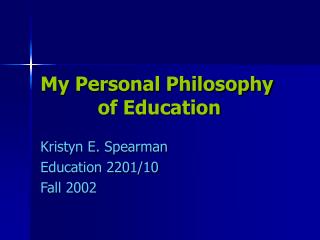 Philosophy of education is sometimes assumed to be a rather abstract discipline that is somehow removed from the ‘real’ practice of education – but this has not been my experience. The purpose of this writing is not only to insist the public exposure to the educational philosophy, but also to identify a major fact that education cannot achieve its ultimate objectives until the end user is willing to accept it as a constructive tool.
Philosophy of education is sometimes assumed to be a rather abstract discipline that is somehow removed from the ‘real’ practice of education – but this has not been my experience. The purpose of this writing is not only to insist the public exposure to the educational philosophy, but also to identify a major fact that education cannot achieve its ultimate objectives until the end user is willing to accept it as a constructive tool.
Following individual assessment, Aarhus University may grant admission to the degree programme for applicants who do not meet the educational requirements but who are deemed to have the necessary qualifications to be able to complete the degree programme.
Ibne Khaldun, in fourteenth century, expresses the view that education consists off intellectual, social, and moral training through which hidden potentialities are developed, traits of character are built and culture of the people is conveyed to the coming generations.
Today, work and leisure are still strictly separated, but leisure time and recreation are some of the most important aspect of modern life, showing how the history of leisure and recreation has altered throughout time, and become increasingly popular as people gain more freedom from work and toil.
It is a very legit question and for this we can go even back to Socrates with him asking if an educated individual is a better individual and the answer could be “no” may be not, but historically the biggest damages to the environment and the overpopulation has always been done by less developed and freedom deprived nations and even in the most developed one the urbanization usually reduced the number of children per family, the education or as we can say the intellectualization of more people and the new opportunities involving these people in the Global competition will possibly reduce the risk form overcrowding or environmental disasters then increase the current one.
